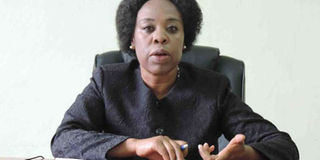Here’s what to do if you buy fake seeds

Kenya Plant Health Inspectorate Service (KEPHIS) Managing Director Esther Kimani during a past interview with the Seeds of Gold. PHOTO | FRANCIS MUREITHI | NATION MEDIA GROUP
What you need to know:
- We also make field inspections to monitor processing, laboratory tests to determine germination capacity, moisture content and health status of seeds before they are graded into different sizes, treated with protective chemicals, packaged and sealed.
- Our analytical chemistry laboratory also analyses pesticides formulation and residue in a wide range of agricultural produce, soil, water and fertilisers.
Have you ever bought seeds or other farm inputs and they turned out to be fake? FRANCIS MUREITHI had a chat with Kenya Plant Health Inspectorate Service (Kephis) managing director, DR ESTHER KIMANI, on what recourse a farmer can take, the status of the maize necrosis disease and what the regulator is doing to ensure agricultural inputs and produce are of acceptable standards.
Many farmers have bought seeds, planted them and ended up with low produce than what was promised? What should such a farmer do?
Always keep the package and receipts after planting. When the seeds perform dismally, you can reach us for help. We recently arbitrated in a case where a supplier sold a farmer sweet corn seeds of a different variety.
The person who had contracted the farmer rejected the produce when it matured saying it was of poor quality. The farmer was staring at Sh200,000 loss. Kephis stepped in and the supplier agreed to meet half of the cost of farming.
Farmers with quality issues on seeds and other inputs can reach us on: 0722516221, 0723786779, 0733874274 or 0734874141.
Our plant inspectors are always on high alert at exit and entry points. All the seed stockists and agents must be licensed by us and they must keep records of supplies to the agents and stockists who in return must issue receipts for all seeds sold out.
We want our farmers to reap from their agribusinesses. They should start by analysing their soils to check if they are infected with bacteria and have required nutrients.
They should also do regular analysis of river and borehole water for those using any of the two for irrigation. Application of inputs must always be of the recommended standards.
Explain briefly what is your role in the seed industry?
Kephis ensures that all seed growers are registered. We also make field inspections to monitor processing, laboratory tests to determine germination capacity, moisture content and health status of seeds before they are graded into different sizes, treated with protective chemicals, packaged and sealed.
Our analytical chemistry laboratory also analyses pesticides formulation and residue in a wide range of agricultural produce, soil, water and fertilisers.
What is you work in the agricultural export trade?
We make sure our produce remains globally competitive by inspecting exports so that they adhere to strict hygiene practices and principles of food safety right from land preparations to documentation of all pesticides used (the pesticides must be approved by the Pest Control Products Board), their rates and application levels, safety provisions in application to post-harvesting and the final analytical checks of the produce.
We also inspect greenhouse produce to make sure they comply with international markets such as European Union.
Kenya has been worst hit by the deadly Maize Necrosis Lethal Disease leading to huge losses. What has the country achieved so far in the fight against the disease?
This season, we have not detected this disease in maize growing areas. We intensified inspection of fields of all companies growing seeds for commercialisation across the country to ensure they are free of that disease.
Last season, we were able to do that and all seeds that were earmarked for planting were analysed and those found infected were rejected and healthy ones approved. This is what has helped to stop the disease.
What is your take on the current laws governing seeds and planting materials?
Many farmers fall prey to fake or poor quality seeds but they are not compensated by merchants.
There is need to review the Seed and law on plant varieties and the one on crop protection to strength them in a bid to tighten the noose on unscrupulous traders.




